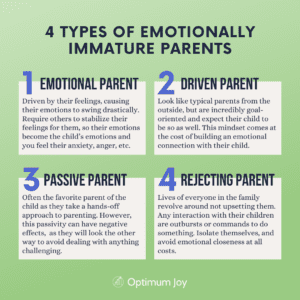Healing From Emotionally Immature Parents
What Is An Emotionally Immature Parent?
Emotionally immature parents can be recognized by their lack of emotional intimacy with their child. A child can have their physical needs met without any issues and still have their emotional needs ignored. This can lead to a lack of emotional awareness as an adult that could result in turmoil in relationships, among other things. An emotionally immature parent likely grew up in a home with emotionally immature parents and they are continuing the cycle. This can be helpful for building understanding for an adult with an emotionally immature parent. While this does not excuse the lack of emotional closeness that a parent displays or the toxicity that can be generated from this, it helps to understand the reason a parent behaves in such a way.
Attributes of Emotionally Immature Parents and Their Adult Children
So what does an emotionally immature parent look like? Below is a non-exhaustive list of the attributes of an emotionally immature parent.
- They have low empathy and are emotionally insensitive.
- They fear feelings and might have taught their children that certain feelings are shameful or “bad”.
- They can be killjoys, responding to their children’s ideas or enthusiasm in a dismissive or skeptical way.
- They have little respect for other people’s differing thoughts and opinions.
- They have low-stress tolerance and have trouble admitting mistakes, discounting the facts, and blaming others instead.
- They have intense but shallow emotions, and are typically quick to react.
- They are rigid and single-minded and can become very defensive when people have other ideas.
If you are the child of an emotionally immature parent, then you may have these types of feelings.
- Lingering feelings of anger, loneliness, betrayal, or abandonment.
- Feeling guilty for being unhappy.
- Feeling highly sensitive and perceptive to other people.
- Difficulty trusting your own instincts.
- Lacking self-confidence.
- Feeling trapped in taking care of your parent(s).

Different Types of Emotionally Immature Parents
There are four different types of emotionally immature parents that exist on a spectrum. Identifying the type of emotional immaturity displayed by a parent provides knowledge that can lead to healing. The different types are as follows.
- Emotional Parent: As the name indicates, this type of emotionally immature parent is driven by their feelings. Their emotions can swing drastically between an intense need for you and then quickly withdrawing. They require others to stabilize their feelings for them, which is often where their child comes into play. This means their emotions become the child’s emotions and you feel their anxiety, anger, etc.
- Driven Parent: These parents can look like typical parents from the outside. Look more closely and you will see a parent who is incredibly goal-oriented and expects their child to be so as well. This goal-oriented mindset comes at the cost of building an emotional connection with their child.
- Passive Parent: This parent is often the favorite parent of the child as they take a hands-off approach to parenting. Unfortunately, this passivity can have negative effects, such as by allowing abuse or neglect from the more dominant partner in the relationship towards the child. They will look the other way to avoid dealing with anything challenging.
- Rejecting Parent: This type of parent is “king” in the home and the lives of everyone in the family revolve around not upsetting them. They isolate themselves within the family and any interaction with their children are outbursts or commands to do something. They avoid emotional closeness at all costs.
Managing Relationships With Emotionally Immature Parents
The first step to healing from growing up in a home with an emotionally immature parent is to identify that this was your experience. Other steps include:
- Letting go of the fantasy that your emotionally immature parent will provide you with the emotional connection you desire if you’re able to figure out the perfect thing to say or do.
- Observe your emotionally immature parent’s emotions instead of engaging with them. This requires staying emotionally detached and observing their behavior and what feelings are coming up for you. You can see their pattern of behavior emerge as you observe.
- Learn how to share your feelings to your emotionally immature parent and then let go of wanting that perfect outcome. This requires you to share and let go of the hope your parent will meet you where you’re at and provide you with the emotional closeness you desire. It’s important to speak assertively and clearly express yourself.
- Create personal boundaries in your relationship with your emotionally immature parent. Remember, when you do this, your parent will attempt to pull you back into your unhealthy pattern with them.
If you are a person who feels a sense of emotional disconnect with their parents, then it can be helpful to process through your emotions and gain a better understanding of your experience. The book “Adult Children of Emotionally Immature Parents” by Lindsay C. Gibson is a great resource to help educate yourself further. It can be a great tool along with meeting with a counselor to help you along that journey of healing. Reach out to us here at Optimum Joy today and set up an appointment!
Pete Marlow

Related Articles
-
Coming Out: Not An Event But A Process
The term “coming out” is a common phrase used in the LGTBQIA+ community in sharing their...
Read More -
The Adolescent Journey Through the 4 Stages of Competence
Adolescence is often a time of immense transformation. It’s a phase marked by transitions – academic,...
Read More -
The Building Blocks of Self-Esteem
Our self-esteem can be seen as one of the foundations of life and how we navigate...
Read More